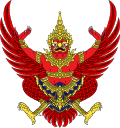| | |||||||||
| |||||||||
All 200 seats in the Senate | |||||||||
| Turnout | 72.08% | ||||||||
|---|---|---|---|---|---|---|---|---|---|
This lists parties that won seats. See the complete results below. | |||||||||
Senate elections were held for the first time in Thailand on 4 March 2000. All candidates ran as independents, as they were forbidden from running on a party ticket. [1]

